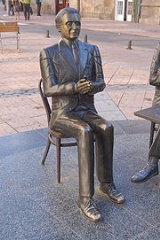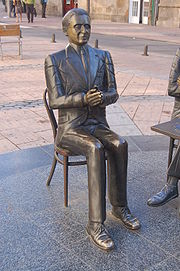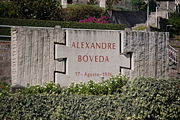
Alexandre Bóveda
Encyclopedia
Alexandre Bóveda Iglesias (Ourense
, 7 June 1903 - executed in A Caeira, Poio
, 17 August 1936), commonly known as Alexandre Bóveda, was a Galician politician and financial officer. He is considered one of the most important Galicianist
intellectuals during the Spanish Second Republic. He was one of the founders and key member of the Partido Galeguista
(Galicianist Party), origin of contemporary Galician nationalism
.
 Bóveda studied French and commerce in the city of A Coruña
Bóveda studied French and commerce in the city of A Coruña
. He also worked as a school teacher in his natal city of Ourense
. He was a regular reader of the Galicianist
journal Nós
, and he soon felt the need to express his own ideas. He started publishing in the magazine La Zarpa, where he stood out as a great communicator. He also published in the Galicianist newspaper A Nosa Terra.
In 1924 he successfully passed examinations in Madrid
for a managerial position at the Spanish Ministry of Economy and Finance. He was offered a post in the Spanish capital by José Calvo Sotelo
, but Bóveda opted for moving back to Galicia, where he worked at the delegation of the ministry in Ourense. After successfully passing further examinations for a more senior position in accountancy, Bóveda eventually moved to Pontevedra
in 1926. Pontevedra was at that time the central point of all Galicianist activity and cultural life in the country. Soon, Bóveda got acquainted with intellectuals such as Castelao
and Losada Diéguez, deepening in his Galicianist political convictions.
In 1930 Boveda becomes the first director of the Caixa de Aforros Provincial de Pontevedra (Credit Union
of Pontevedra). In 1928 and 1929 he is awarded with two professional grants from the provincial government to travel to Barcelona
and the Basque Country
in order to further study the functioning of credit unions.
In 1931 he is one of the founding members of the Partido Galeguista
(Galicianist Party), a party with clear nationalist
ideals. In 1932 he participated in the first meeting for the drafting of the Galician Statute of Autonomy
, held in Santiago de Compostela
. Bóveda was greatly involved in this project, to the point that Castelao
considered him the person "without whom there would have not been a Statute". In 1933 he was designated as "core member" by the Comité de Autonomía (Committee for Autonomy). In fact, Castelao
and other members of the Partido Galeguista (Galicianist Party) stated that Bóveda was the "motor" behind the whole process. Castelao and Bóveda were close personal friends. Castelao often labelled Bóveda as a "man of action", and unquestionably his "right-hand man" in setting up the Galicianist Party and moving the Statute of Autonomy forward.
In 1934, and probably linked to his political activities, he was transferred to the tax office of the southern Spanish city of Cádiz
. Yet, he managed to return to Galicia in 1935, where he worked at the tax office in Vigo
.
In 1936 he actively participated in the elections
. He was a candidate for the Frente Popular
alliance (Popular Front, which included the Galicianist Party), representing the province of Ourense. That same year he moved back to work at the tax office of Pontevedra.
 However, 1936 was also the year of the Francoist
However, 1936 was also the year of the Francoist
revolt, start of the Spanish Civil War
and subsequent Francoist dictatorship. Alexandre Bóveda was captured on July 20, accused of treason to Spain because of his Galician nationalist ideals, and sentenced to death. He was executed on the 17 August 1936 in the place of A Caeira, Poio
(near Pontevedra).
At present, the date is celebrated in Galicia with the name Día da Galiza mártir, where those who died for Galicia ("martyrs") are honoured. A monument was erected in the same spot where he was killed, that being the place where the official ceremony takes place every August 17, with local authorities and local representatives from the Galician government
attending.
Ourense
Ourense is a city in northwestern Spain, the capital of the province of the same name in Galicia. Its population of 108,674 accounts for 30% of the population of the province and makes it the third largest city of Galicia.-Population:...
, 7 June 1903 - executed in A Caeira, Poio
Poio
Poio is a municipality in Galicia, Spain in the province of Pontevedra. Poio is located in the North shore of the Ria de Pontevedra, between Sanxenxo and the provincial capital, Pontevedra. Its more than 20 coastal km are full of beautiful beaches with quiet waters. The tourism industry has begun...
, 17 August 1936), commonly known as Alexandre Bóveda, was a Galician politician and financial officer. He is considered one of the most important Galicianist
Galicianism (Galicia)
Galicianism is a political ideology of nationalist character whose objective is the defence of Galicia and its culture by the means of the establishment and strengthening of its own institutions.-Origins:...
intellectuals during the Spanish Second Republic. He was one of the founders and key member of the Partido Galeguista
Partido Galeguista (1931)
The Partido Galeguista was a Galician nationalist party founded in December 1931. It achieved notoriety during the time of the Spanish Second Republic...
(Galicianist Party), origin of contemporary Galician nationalism
Galician nationalism
Galician nationalism is a political movement arguing for the recognition of Galicia as a nation. The political movement referred to as modern Galician nationalism was born at the beginning of the twentieth century from the idea of Galicianism.- Ideology :...
.
Biography

A Coruña
A Coruña or La Coruña is a city and municipality of Galicia, Spain. It is the second-largest city in the autonomous community and seventeenth overall in the country...
. He also worked as a school teacher in his natal city of Ourense
Ourense
Ourense is a city in northwestern Spain, the capital of the province of the same name in Galicia. Its population of 108,674 accounts for 30% of the population of the province and makes it the third largest city of Galicia.-Population:...
. He was a regular reader of the Galicianist
Galicianism (Galicia)
Galicianism is a political ideology of nationalist character whose objective is the defence of Galicia and its culture by the means of the establishment and strengthening of its own institutions.-Origins:...
journal Nós
Nós
Nós is an Irish language youth lifestyle magazine. The magazine first began publishing online on 17 March 2008 as part of the annual Irish language week, Seachtain na Gaeilge...
, and he soon felt the need to express his own ideas. He started publishing in the magazine La Zarpa, where he stood out as a great communicator. He also published in the Galicianist newspaper A Nosa Terra.
In 1924 he successfully passed examinations in Madrid
Madrid
Madrid is the capital and largest city of Spain. The population of the city is roughly 3.3 million and the entire population of the Madrid metropolitan area is calculated to be 6.271 million. It is the third largest city in the European Union, after London and Berlin, and its metropolitan...
for a managerial position at the Spanish Ministry of Economy and Finance. He was offered a post in the Spanish capital by José Calvo Sotelo
José Calvo Sotelo
José Calvo Sotelo, 1st Duke of Calvo Sotelo was a Spanish politician prior to and during the Second Spanish Republic...
, but Bóveda opted for moving back to Galicia, where he worked at the delegation of the ministry in Ourense. After successfully passing further examinations for a more senior position in accountancy, Bóveda eventually moved to Pontevedra
Pontevedra
Pontevedra is a city in the north-west of the Iberian Peninsula. It is the capital of both the comarca and province of Pontevedra, in Galicia . It is also the capital of its own municipality which is, in fact, often considered as an extension of the actual city...
in 1926. Pontevedra was at that time the central point of all Galicianist activity and cultural life in the country. Soon, Bóveda got acquainted with intellectuals such as Castelao
Castelão
There are two association football stadiums nicknamed Castelão:*Castelão , located in São Luís, Maranhão, Brazil*Castelão , located in Fortaleza, Ceará, Brazil-Other:...
and Losada Diéguez, deepening in his Galicianist political convictions.
In 1930 Boveda becomes the first director of the Caixa de Aforros Provincial de Pontevedra (Credit Union
Credit union
A credit union is a cooperative financial institution that is owned and controlled by its members and operated for the purpose of promoting thrift, providing credit at competitive rates, and providing other financial services to its members...
of Pontevedra). In 1928 and 1929 he is awarded with two professional grants from the provincial government to travel to Barcelona
Barcelona
Barcelona is the second largest city in Spain after Madrid, and the capital of Catalonia, with a population of 1,621,537 within its administrative limits on a land area of...
and the Basque Country
Basque Country (autonomous community)
The Basque Country is an autonomous community of northern Spain. It includes the Basque provinces of Álava, Biscay and Gipuzkoa, also called Historical Territories....
in order to further study the functioning of credit unions.
In 1931 he is one of the founding members of the Partido Galeguista
Partido Galeguista (1931)
The Partido Galeguista was a Galician nationalist party founded in December 1931. It achieved notoriety during the time of the Spanish Second Republic...
(Galicianist Party), a party with clear nationalist
Galician nationalism
Galician nationalism is a political movement arguing for the recognition of Galicia as a nation. The political movement referred to as modern Galician nationalism was born at the beginning of the twentieth century from the idea of Galicianism.- Ideology :...
ideals. In 1932 he participated in the first meeting for the drafting of the Galician Statute of Autonomy
Galician Statute of Autonomy (1936)
The Galician Statute of Autonomy was a statute of autonomy for Galicia. It was voted in referendum and presented to the Spanish Parliament. Yet, it could never be implemented because of the Spanish Civil War and subsequent Francoist dictatorship...
, held in Santiago de Compostela
Santiago de Compostela
Santiago de Compostela is the capital of the autonomous community of Galicia, Spain.The city's Cathedral is the destination today, as it has been throughout history, of the important 9th century medieval pilgrimage route, the Way of St. James...
. Bóveda was greatly involved in this project, to the point that Castelao
Castelão
There are two association football stadiums nicknamed Castelão:*Castelão , located in São Luís, Maranhão, Brazil*Castelão , located in Fortaleza, Ceará, Brazil-Other:...
considered him the person "without whom there would have not been a Statute". In 1933 he was designated as "core member" by the Comité de Autonomía (Committee for Autonomy). In fact, Castelao
Castelão
There are two association football stadiums nicknamed Castelão:*Castelão , located in São Luís, Maranhão, Brazil*Castelão , located in Fortaleza, Ceará, Brazil-Other:...
and other members of the Partido Galeguista (Galicianist Party) stated that Bóveda was the "motor" behind the whole process. Castelao and Bóveda were close personal friends. Castelao often labelled Bóveda as a "man of action", and unquestionably his "right-hand man" in setting up the Galicianist Party and moving the Statute of Autonomy forward.
In 1934, and probably linked to his political activities, he was transferred to the tax office of the southern Spanish city of Cádiz
Cádiz
Cadiz is a city and port in southwestern Spain. It is the capital of the homonymous province, one of eight which make up the autonomous community of Andalusia....
. Yet, he managed to return to Galicia in 1935, where he worked at the tax office in Vigo
Vigo
Vigo is a city and municipality in north-west Spain, in Galicia, situated on the ria of the same name on the Atlantic Ocean.-Population:...
.
In 1936 he actively participated in the elections
Spanish general election, 1936
Legislative elections were held in Spain on February 16, 1936. At stake were all 473 seats in the unicameral Cortes Generales. The winners of the 1936 elections were the Popular Front, a left-wing coalition of the Spanish Socialist Workers' Party , Republican Left , Esquerra Republicana de...
. He was a candidate for the Frente Popular
Popular Front (Spain)
The Popular Front in Spain's Second Republic was an electoral coalition and pact signed in January 1936 by various left-wing political organisations, instigated by Manuel Azaña for the purpose of contesting that year's election....
alliance (Popular Front, which included the Galicianist Party), representing the province of Ourense. That same year he moved back to work at the tax office of Pontevedra.

Francisco Franco
Francisco Franco y Bahamonde was a Spanish general, dictator and head of state of Spain from October 1936 , and de facto regent of the nominally restored Kingdom of Spain from 1947 until his death in November, 1975...
revolt, start of the Spanish Civil War
Spanish Civil War
The Spanish Civil WarAlso known as The Crusade among Nationalists, the Fourth Carlist War among Carlists, and The Rebellion or Uprising among Republicans. was a major conflict fought in Spain from 17 July 1936 to 1 April 1939...
and subsequent Francoist dictatorship. Alexandre Bóveda was captured on July 20, accused of treason to Spain because of his Galician nationalist ideals, and sentenced to death. He was executed on the 17 August 1936 in the place of A Caeira, Poio
Poio
Poio is a municipality in Galicia, Spain in the province of Pontevedra. Poio is located in the North shore of the Ria de Pontevedra, between Sanxenxo and the provincial capital, Pontevedra. Its more than 20 coastal km are full of beautiful beaches with quiet waters. The tourism industry has begun...
(near Pontevedra).
At present, the date is celebrated in Galicia with the name Día da Galiza mártir, where those who died for Galicia ("martyrs") are honoured. A monument was erected in the same spot where he was killed, that being the place where the official ceremony takes place every August 17, with local authorities and local representatives from the Galician government
Xunta de Galicia
The Xunta de Galicia is the collective decision-making body of the government of the autonomous community of Galicia, composed of the President, the Vice-President and the specialized ministers ....
attending.
External links
- Fundación Alexandre Bóveda - foundation dedicated to his life and work (in Galician)
Further reading
- Carballo, F. (1999): Alexandre Bóveda. Promocións Culturais Galegas / A Nosa Terra, Vigo
- Gutiérrez, E. (2003): Alexandre Bóveda en A Nosa Terra. Edicións Laiovento, Santiago de Compostela
- Leira, X. and Abalo, J.L. (2004): Alexandre Bóveda, unha crónica da Galiza mártir. Acuarela Comunicación, Moaña
See also
- Galician Statute of Autonomy (1936)Galician Statute of Autonomy (1936)The Galician Statute of Autonomy was a statute of autonomy for Galicia. It was voted in referendum and presented to the Spanish Parliament. Yet, it could never be implemented because of the Spanish Civil War and subsequent Francoist dictatorship...
- Partido Galeguista (1931)Partido Galeguista (1931)The Partido Galeguista was a Galician nationalist party founded in December 1931. It achieved notoriety during the time of the Spanish Second Republic...
- Galician nationalismGalician nationalismGalician nationalism is a political movement arguing for the recognition of Galicia as a nation. The political movement referred to as modern Galician nationalism was born at the beginning of the twentieth century from the idea of Galicianism.- Ideology :...

